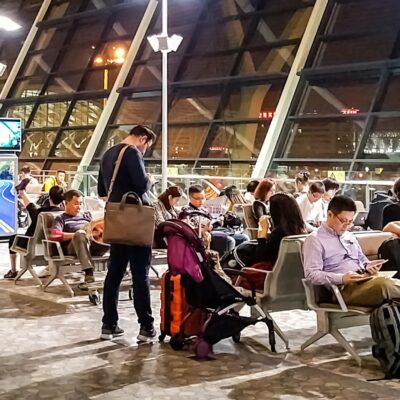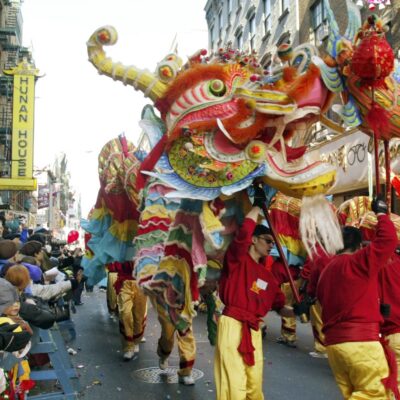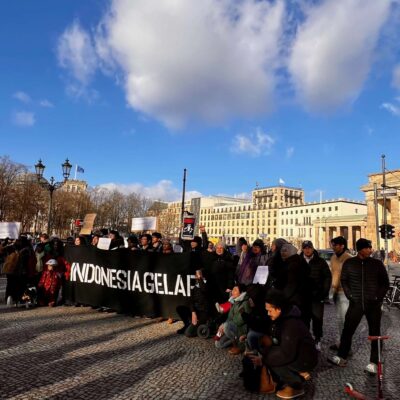China’s platform economy, where consumers book transport or meal deliveries through digital platforms is huge and growing.
The implications are significant for workers in insecure employment, often operating under extreme time pressure for long hours with few work rights.
While these issues are not confined to China, Chinese workers don’t have the right to strike, freedom of association is not protected by law, and civil society is weak.
Chris Chan was a labour scholar and activist in Hong Kong and is currently a Senior Lecturer at the School of Business and Management, Royal Holloway, University of London. He is researching labour, civil society, and social movements particularly in mainland China and Hong Kong. He spoke with Melbourne Asia Review’s managing editor, Cathy Harper.
Platform workers, especially food delivery drivers are becoming part of everyday life around the world. Can you paint a general picture as to what work is like in China for these workers?
Everyone is currently talking about the casualisation of work in the digital sector and China is no exception. What makes China different is the huge proportion of workers in the platform economy—9.7 percent of the total workforce in 2019 according to an ILO study. This is much higher than the UK (four percent) and the US (0.4-0.6 percent). In terms of total numbers, there were 75 million workers in 2018 in the Chinese platform sector. The figure has continued to rise in recent years.
What are some of the key characteristics of these workers?
Taking Meituan, one of the main delivery platforms, as an example, 90 percent of its workers are male and they are very young—82 percent were born in the 1980s and 1990s. As well, 66 percent of the workers have senior high school education or above and 16 percent have college or university education. In China it is very normal for workers to come from rural villages or small towns—85 percent are migrant workers.
Over the past 10 years and more, the Chinese government initiated a strategy to upgrade the economy. Some factories were closed down and moved to Vietnam and other countries so the government can better promote high technology production. But this doesn’t mean China doesn’t need low end unskilled workers—they need lots of them.
Why have workers come from rural areas to do these jobs which not well paid and don’t come with good working conditions, especially if they are reasonably highly educated?
There is a long history of internal labour migration in China starting from 1978 when Deng Xiaoping introduced economic reform. After that, rural villages released an ‘unlimited’ supply of labour—people who came to cities, mostly in southern China, such as Guangzhou and Shenzhen, as well as east China. This pattern of labour migration continues now. But these workers can’t settle permanently in the cities because of the ‘hukou’ (household registration) system, which started in Mao’s China in 1958. The policy separated the whole population into urban and rural residential status, and residents were not allowed to move and settle in the other part of the country without permission. After 1978, rural-urban migrant workers, who are usually called ‘peasant workers’ in China, are allowed to work in the city but their household registration remains in a rural village, which means they are not entitled to the social benefits of urban workers.
The situation has changed to some extent in the past two decades. For example, a Social Insurance Law was introduced in 2011 which stipulates that all employees, including urban and peasant workers, are entitled to pension, medical, unemployment, work-related injury and maternity insurance (commonly referred to as the five insurances). Another regulation also states that employers should contribute to a Housing Provident Fund for their employees, including peasant workers. For migrant workers who work in a factory or a company, they can assume that they are entitled to these ‘five insurances’ as well as the Housing Provident Fund protection. But the key issue is that the laws are poorly enforced in China and so the social insurance participation rate for migrant workers is still very low.
Another barrier to migrant workers settling in cities is that housing and living costs in the city are much higher than in villages. With a residential status in a rural village, migrant workers can usually live in their family house and work farming the land. Today some cities are able to offer urban hukou status for migrant workers, especially skilled workers with a higher level of education. But some workers prefer to keep their rural village hukou status because having a home in a village and a job in the city can lower their living costs. This is a very common arrangement that workers accept. Often their families remain in the village where the cost of children’s education and expenses for elderly parents are much lower.
What kind of problems do platform workers face in the course of their work?
With the decline of labour-intensive industries, many migrant workers are now working in the service sector, including the booming platform economy. The key structural problem is that there is no social insurance and no employment contracts for those involved in platform work. They are not protected by labour laws because they are regarded as self-employed workers. In the food delivery sector, for example, before 2017, some workers were employed directly by the platforms under employment contracts. But after 2018, the direct employment model was replaced by an outsourcing model whereby workers aren’t employed by the platform itself, but by a human resources agency as self-employed contractors. This means that workers lost their rights to social insurance and other employment protection. The unique situation in China is that the outsourcing system can be multi-layered: a human resources agency can further contract out services to smaller companies which makes it even more difficult for workers to claim compensation.
Compared with other countries where major giant global companies compete with each other, Chinese private domestic capital has dominated their domestic market. In the food delivery sector, there are two major players—one is Meituan (which is a shopping platform for local consumer products and retail services), the other is Eleme (an online food delivery platform). The two giants compete with each other to cut service fees for customers, which means they pay lower wages. From 2018, there has been a continual reduction in the ‘piece-rate’. There has been a lot of protests and campaigns around this issue. The human resources agencies claim that as workers are independent contractors, they can reduce the piece-rate without consulting with their workers. This is a major urgent issue for workers.
What are the usual hours worked per day and levels of pay?
There are two types of workers, the full-timers who mostly rely on gig work such as food delivery as their major source of income and those who work on a part-time basis. Full-time workers usually work very long hours such as 10 hours or more a day. Their salary is not too bad compared with factory workers in big cities and they have more freedom in terms of when they work. Their total income is more or less that of factory workers, more than 3,000 yuan per month (approximately US$500 per month). This is the common level of income in the biggest cities but in the second and third tier cities it is lower. We have interviewed workers as part of our research, and a part-time worker told us that he operates his own business selling breakfasts in the morning, after which he delivers food for a few hours during lunchtime and then works at a restaurant in the evening. While platform income is usually similar to that of a factory worker, some can choose to work very hard and earn more than that by working longer hours.
The key issue is that they are regarded as self-employed and so are not entitled to social insurance. For example, road traffic incidents are common, but they are unable to claim work injury compensation as the company does not buy work-related injury insurance for them. Also, the law generally states that employers should pay a high proportion of workers’ salaries as pension insurance. In some cities, employers have to pay 18 percent while the workers pay eight percent, but, again, enforcement is loose. For gig workers, as they are classified as ‘self-employed’, the companies won’t pay pension insurance for them. Their actual income is not bad, but they don’t have other benefits.
What kinds of civil action has there been by workers in terms of protests and strikes or other forms of collective action?
In China, it is very common to organise a ‘wild-cat’ strike, which means ‘unorganised’ or semi-organised strike. These are not organised by a trade union but by informal leaders. In 2015 and 2018 there were two waves of state crackdowns on independent labour NGOs. Some of these labour NGOs in South China had played an important role in supporting and organising workers in protests and collective actions earlier, but they are not active anymore after 2018. Now, most strikes are initiated by workers themselves. Between 2018 and 2019 there were lots of worker protests in the food delivery sector. As I mentioned, before 2018 when the food delivery platform companies just started their business and wanted to stabilise their workforce, they gave workers better conditions including formal employment contracts. But after 2018 with increased market competition, the status of workers was changed from direct employees to self-employed contractors working for human resource agencies. Moreover, as I mentioned earlier, workers have their piece-rate service fee consistently reduced by the companies, which means they have had to work harder if they want to maintain their income level. This situation has resulted in lots of protests and strikes, where hundreds of workers stopped working and tried to negotiate with the company—usually the lower-level company, the agency, rather than the national parent company.
How successful do you think these strikes are?
A common response from the company is to get concessions, but sometimes it’s not directly related to workers’ core concerns about employment protection and higher piece-rates. It’s a complicated system: if you work in peak-hours you can get paid more than at other times. There is also an individual worker performance rating system: if you are rated higher, you can get higher pay or have a priority on taking orders. Sometimes concessions are made on matters such as how to calculate the service fee, how to distribute orders or give hardworking workers a bonus. But the companies have rarely responded directly to the core matters sought by workers: higher piece-rates and employment contracts which include social insurance.
What about the implications for those involved in strikes in terms of potentially being penalised by their employers and/or being arrested?
In China, the right to strike is not protected by law. But from 2002-2012, when President Hu Jintao and Premier Wen Jiabao were in power, local governments tolerated workers’ strikes. Some scholars even argued that while the right to strike was removed in the revision of Chinese constitution in 1982, the law does not ban strikes, so it is a ‘grey area’ in the Chinese legal system. Strikes were very common at that time and strikers were rarely punished. But under the current government of Xi Jinping over the past ten years restrictive policies have been introduced to clamp down on labour protests. From time to time, strike leaders have been arrested and jailed.
However, ‘wild-cat’ strikes can be very small-scale, less than 100 workers involved. In these situations it can be difficult to identify the informal leaders and the impact of the strikes is limited, so usually no punitive action is taken from the state. But if you try to organise a large-scale strike with a more substantial organisation, there will be consequences. Earlier, I mentioned a crackdown on NGOs in 2015 and 2018. It was imposed because some NGOs tried to organise workers to go on strike or help them establish trade unions in the workplace. This form of organising and organisation is not allowed by the Chinese Communist Party.
Chen Guojiang, a worker known as Mengzhu (a short name for ‘Leader of the Delivery Riders Alliance’) organised more than 14,000 workers to join WeChat accounts that he initiated. Then he tried to go further and organise in-person meetings for those involved in the alliance. This kind of organising is very sensitive in China, even though it was informal, and he was arrested in early 2021, accused of ‘picking quarrels and provoking trouble’. He spent 12 months in prison and has had to keep quiet after his release. This is a very common pattern in terms of penalty for workers: If you just join a strike, it is fine; or if you organise a one-off and small-scale informal strike it is not a big problem. But if the operation becomes a high-profile movement, you will be arrested and it will be hard for outsiders to know what happened to you during this period of time. Under pressure, those who have been arrested usually don’t continue their activism after being released.
How does the Community Party under Xi justify its repression of workers’ rights. It’s supposed to be the party of the workers, isn’t it?
While China is criticised in relation to the absence of freedom of association, they say that workers are allowed to establish or be members of trade unions. But all trade unions must be affiliated to the All-China Federation of Trade Unions (ACFTU). The ACFTU is one of the mass organisations under the leadership of Chinese Communist Party. Only the local branches of the ACFTU have legal rights to organise workplace trade unions. If workers plan to organise a trade union, they must get approval and assistance from upper-level official trade unions first. Official trade unions do not support or encourage strikes, because it is unlawful. In the past, if workers wanted to organise a strike they could get support from labour NGOs, but since the crackdown such NGOs have been described by the government as ‘foreign forces’ and it has been politically dangerous for them.
Could you reflect on what you think the employment of platform workers in China tells us about the state of civil society in China?
In the past there were quite a lot of active labour NGOs which were funded by international foundations. They were founded by lawyers, journalists, academics or workers themselves and were an important component of Chinese civil society. The crackdown by the state on civil society under Xi Jinping means that if the labour NGOs want to survive, they have to change their strategies. For example, they can only get funding from the state or from foundations approved by the state, or they can only provide services for workers such as education on labour rights. This is the general situation of civil society in China. The authoritarian state has further centralised its power.
There is a big debate about whether there is still civil society in China.
One the other hand, some civil society actors have also demonstrated their resilience in relation to labour rights. Actors such as journalists or students continue to publish articles about labour rights and advocate for policy change. For example, a graduate student at Peking University worked as a food delivery rider for six months, after which he wrote academic papers and articles for popular media which were widely circulated online. Then the mainstream media interviewed him about working conditions and how the platform company exploited workers. He has successfully drawn public attention to the problem. This is one of the reasons that in recent years the government strengthened protections for platform workers. For example, in 2021 the government introduced a series of new policies to protect the rights of platform workers, including minimum wage and insurance protection.
I would say this is a very difficult time for civil society actors in China. Civil society in the western sense emphasises the role of organisations, and in China today independent organisations are very difficult to establish and sustain. But there are still many individuals who are active in influencing policy and they are more-or-less playing the role of civil society. This is another way to think about the issue of civil society in China.
Main image: A Meituan bike. Credit: Jon Russell/Flickr.




